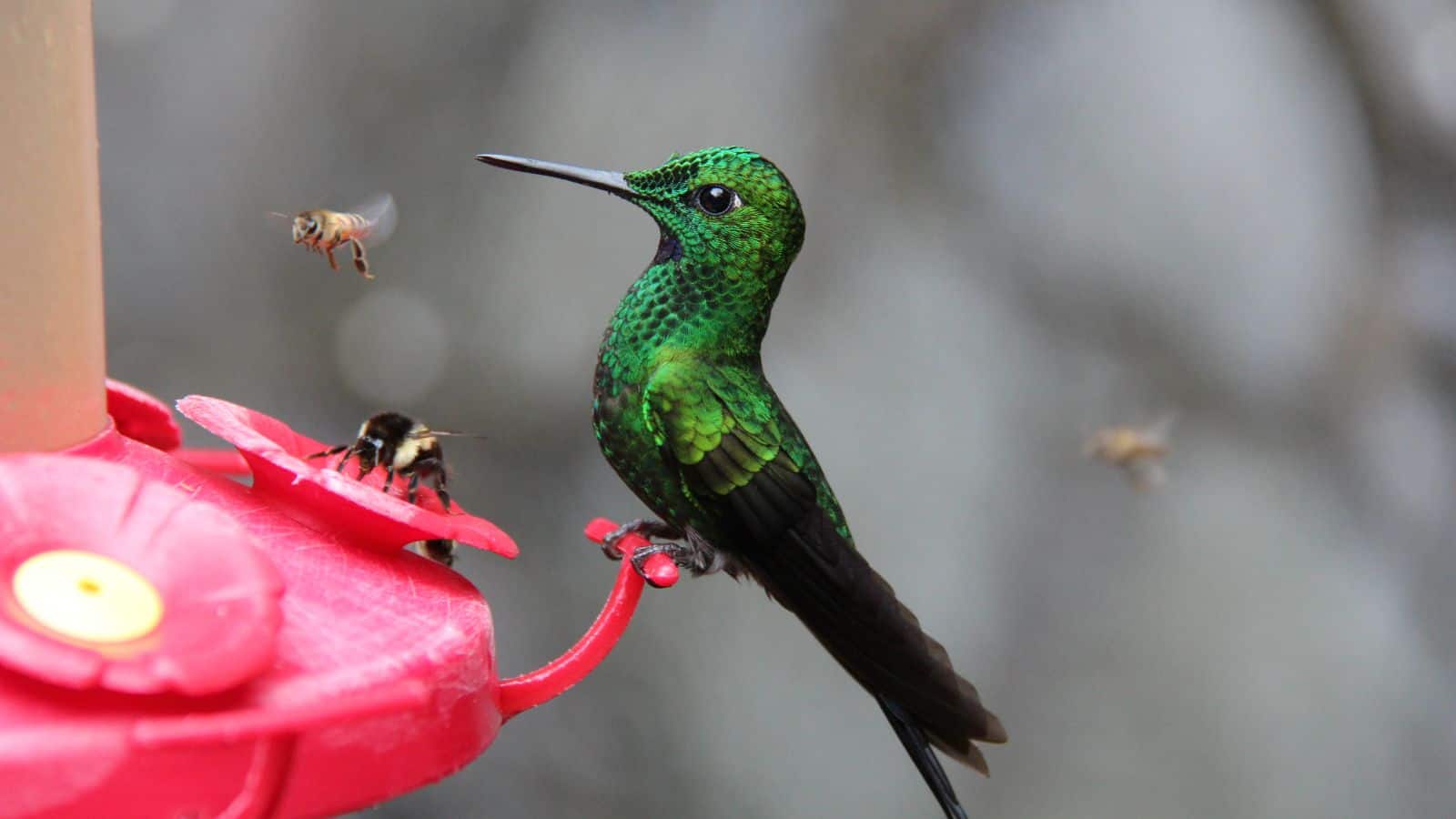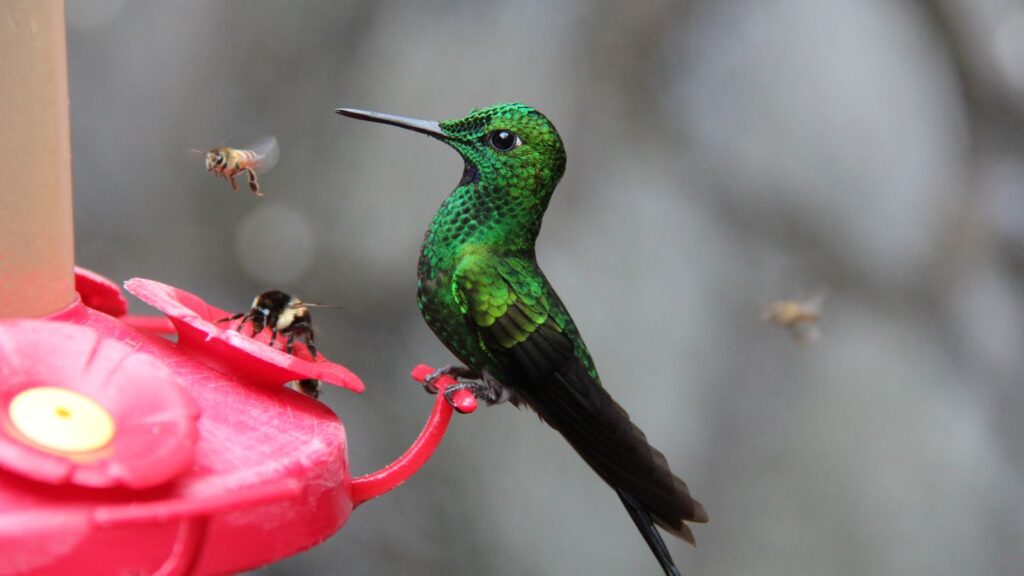If you put out hummingbird feeders, it won’t come as a surprise that bees and wasps also enjoy sugar water, and that can create quite a problem at your feeders.
An aggressive wasp in particular will chase hummingbirds away to take command over a feeder, and even though wasps have to eat too, you don’t really want to be the one feeding them near your home.
Save this article for later so you don't lose it. Enter your email and I'll send it to you now—plus you'll get my favorite backyard birding tips delivered to your inbox.
Perky-Pet Yellow Bee Guards for Hummingbird Feeders
Check PriceHummingbirds Eat Insects – But Not Bees and Wasps
Despite being known as birds that drink nectar from flowers and feeders, the typical hummingbird diet is about 80 percent insects, according to University of Delaware Entomologist Doug Tallamy.
They feed on a variety of insects – mostly gnats, ants, mosquitoes, fruit flies, and so on. They may pick out some bigger bugs like spiders or beetles, but bees and wasps are not on the menu.
Bees can sting hummingbirds – or at least threaten to – providing a much more significant threat to hummingbirds than the potential meal is worth.
A bee or wasp sting causes a little bit of pain and annoyance in most humans, but for a hummingbird that weighs less than an ounce, a sting can be deadly, according to Terry Johnson of the Georgia Department of Natural Resources.
What Happens When Hummingbirds and Bees Cross Paths?
If you’ve had a hummingbird feeder that has ever gotten some nectar outside of its ports and become an attractant for wasps or bees, you’ve probably seen this matchup play out.
Hummingbirds and stinging insects can sometimes feed in harmony, but other times, even one single wasp can chase off a hummingbird from a feeder and force it to consider another nectar source.
How to Keep Bees and Wasps From Hummingbird Feeders

Considering the threat to a hummingbird that bees and wasps may pose, it makes sense that you want to keep them away from your hummingbird nectar.
You can’t keep bees away from accessing nectar from flowers, and you don’t want to. After all, bees are prolific pollinators, making them a very important part of the ecosystem.
Some bee populations have dwindled dangerously in recent years. But your feeders, which are often placed near your home, can become a hotbed for stinging insects, and that’s something you probably don’t prefer.
Fortunately, there are ways to keep unwanted visitors away.
Get our free Hummingbird Attraction Guide! Plus, we'll send you our best tips for attracting more birds to your yard.
The first thing you can do is choose the right type of feeder that deters bees but still allows hummingbirds to access the nectar inside and keep that feeder clean. The sweet scent of sugar water coating the outside of a feeder is more likely than anything to attract bees and wasps.
Other things you can do include placing feeders correctly and adding bee guards to feeders. For Wild Bird Scoop’s complete guide to deterring bees and wasps, click here.
You can also help reduce conflicts between bees and hummingbirds by providing ample food sources in your yard.
Planting a pollinator garden with many types of flowers can provide you with a beautiful property that has a great foundation for a healthy ecosystem.
Saving the Bees

According to Ohio State University, commercial beekeepers in the United States have reported yearly honey bee colony loss rates of about 30 percent, double or triple historical rates of between 10 and 15 percent.
Multiple native bee species are present on the endangered species list, which is cause for concern. Declines in bee populations have the potential to cause significant issues at the base of healthy ecosystems across the globe as well as hurt food production of important crops.
Even some wasp species, which are often seen as nasty nuisances, can be effective pollinators. The University of Maryland states that although they are mostly carnivorous, wasps also rely on sugary foods like nectar from flowers or fruit juices as sources of food.
You don’t need to be the biggest fan of wasps, and you still likely don’t want nests built near your home or garage. However, maybe next time you see a wasp, you’ll look at it in a bit of a different light.
Frequently Asked Questions
Are Bees a Threat to Hummingbirds?
On a large scale, bees are not a threat to hummingbirds and hummingbird populations. The two have lived alongside one another pollinating the same flowers for thousands of years.
The two share potential food sources such as flowers and may interact at feeders in search of the sugary liquid inside, but these conflicts usually resolve with one finding other food.
Do Wasps Kill Hummingbirds?
Wasps aren’t out to kill hummingbirds, but they could kill a hummingbird with a sting. Hummingbirds are small, so just a little bit of venom from a sting can be a serious threat.
Are Hummingbirds Aggressive?
Encountering an aggressive hummingbird isn’t surprising. They’re often very territorial toward other hummingbirds for food sources, and they may even buzz a person if they feel threatened.
As it relates to bees and wasps, hummingbirds are not likely to be aggressive, as stinging insects aren’t a food source for them, and if bees or wasps have control over a food source like a feeder, it’s often the hummingbird that makes way.
In Conclusion
Hummingbirds and stinging insects are both vital pollinators, but they may not always get along.
This doesn’t mean that either one would ever eat the other, however. Even though hummingbirds eat insects and wasps are carnivorous, the two species often compete for food sources, not look at one another as such.
Unfortunately, the populations of many hummingbirds and bee species are in concerning decline, so many people are looking to help both thrive.
The best thing you can do to help pollinators like bees and hummingbirds in your yard is to provide a variety of flowers and create a backyard full of life, which starts with native plants and in turn, insects.


